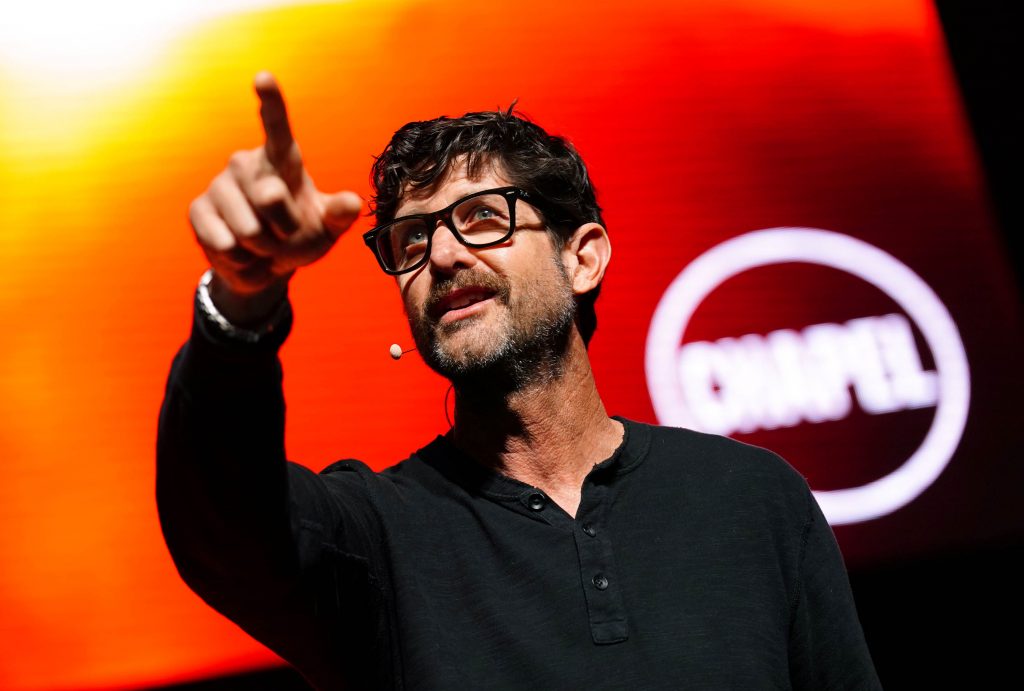
Photos by Ralph Freso / Slideshow
Let’s be honest: “Do you think you are better looking than the average person?”
Jason Fritz, lead pastor of Illuminate Community Church in Scottsdale, started Monday’s Chapel at Grand Canyon University asking the Chapel audience to ponder this for a bit.
“Chances are, you said ‘Yes,’” he said.
The book “The Day America Told the Truth” revealed what Americans thought when it came to that question. The book’s authors surveyed thousands of Americans and, as it turns out, more than 80% think they are quite the lookers.
Add to that these numbers from dating app Tinder: That women swipe left 80% of the time to reject the person the app is recommending to them and men swipe left 50% of the time. That leaves us to postulate that women are pickier and men can’t be as good looking or as datable as they think they are.
“Fellas, chances are you’re not one of them,” Fritz said with a laugh then asked, “How do we get it so mixed up? How do we get it so wrong? We tend to think more highly of ourselves than we really should.”
What causes that sense of bloated self-perception?

Well, it’s pride, said Fritz.
We live in a social-media world of highlight reels, best-of collections and image control in a “here’s the image I want you to see of me” reality. It’s our way of elevating ourselves.
Pride is the original sin, rooted right there in the Bible in Isaiah 14:12-14, when Satan declares he will elevate himself above God, and in Proverbs 16:18, when pride comes before the fall of Satan from heaven.
“The thing that’s missing from our world today? Humility,” said Fritz decidedly, even though, “ … In our day, humility isn’t really seen as a virtue; it’s really seen more as a vice, it’s like weakness.”
Yet, Jesus lived a life of humility.

Although He had the privileges of a deity, He humbled himself and “emptied Himself of those privileges.” He served others.
Fritz said two kingdoms exist: the Kingdom of Earth, whose me-me-me ethic is about lust, promoting yourself, doing what you want and living primarily for yourself, and the Kingdom of Heaven, whose ethic is about humility.
In the Kingdom of Heaven, there is great value in humbling yourself.
Fritz said when Jesus’ disciples ask Him who is the greatest in heaven, Jesus tells them in Matthew 18:3-4 to “become like children or you will never enter the Kingdom of Heaven … whoever humbles himself like this child, now that’s greatness.
“You think He cares about how many ‘likes’ He has or how many followers He has? … If you’re thinking about being the top dog, you’ve got to change the way you’re thinking. You’ve got to be more like this child.”
The thing that's missing from our world today? Humility. ... In our day, humility isn't really seen as a virtue; it's really seen more as a vice, it's like a weakness.
Jason Fritz, lead pastor of Illuminate Community Church
Fritz spoke of Catholic priest and “The Return of the Prodigal Son” author Henri Nouwen. He was a Yale and Harvard Divinity School professor and left his role there to live among people with and without learning disabilities in the L’Arche community in France and then L’Arche Daybreak community in Canada. At Daybreak, he was asked to help care for a man named Adam, who had severe disabilities.
When a journalist sought out Nouwen to find out what happened to the great author and saw how he lived his life at Daybreak, the journalist asked, “Why are you here? You should be out teaching the masses, using your intellect to influence the world.”
Without hesitation Nouwen replied, “You don’t understand. Adam has given me more than I ever could give to him, because in caring for Adam, I finally fully understand what it’s like for God to care for me in all of my neediness.”
Fritz referenced a quote from English writer/philosopher John Ruskin who said, “I believe that first test of a great man is his humility.”

And the thing about great people is they never seem to think that the gifts they possess originate with them. Their gifts come through them.
“That they could not do or be anything else than (what) God made them … God is working through you for His glory, and that is what makes you great.”
Humility also is the key to unifying diverse people, Fritz said.
The Apostle Paul wrote about how any healthy church can be divided without humility. Paul writes to do nothing from self-ambition or conceit: “Let each of you look not only to his own interest but also to the interests of others” (Philippians 2:3-4).
Fritz spoke of the word “university” and how it combines “unity” and “diversity” and how the Christian community on GCU’s campus unified not only because of a shared search for academic knowledge but because of a desire to live how Christ lived.
| Next week’s Chapel speaker: |
| Nick Ely, Christ Church, Central Phoenix, 11 a.m. April 3, GCU Arena |
He also referenced the city of Antioch in the Bible, an extremely diverse city but also a united one.
It is in Antioch where the word “Christian” originates, Fritz said.
“Nobody had a word to explain this kind of unity amongst all these diverse people,” and “Christian” was it.
“You’ve got to understand the message that is being sent – unity in the midst of diversity … so Grand Canyon University, everybody should be looking at you as the example of unity in diversity. You set the standard because the quality of that which unites you far surpasses the quality of any other thing that’s going to unite any other group.
“Humility breeds unity.”
Fritz pointed to Jesus as living the ultimate humble life, to the point of His death.
“He picks up the crown of thorns and puts it on His head, and He says: You are more important than I am, and I hope you get the message,” Fritz said. “ … As we display humility, we become the salve that the world needs for our good, and ultimately, for God’s glory.”
***
Related content:
GCU News: Spring Chapel schedule has feel of familiarity
GCU News: CityServe leader: Move toward those in pain
GCU News: No stopping God’s work, Mueller tells Chapel
GCU News: Chapel speaker: What will you do with your failures?
GCU News: Pastor’s Chapel message: Listen to the right voice



































































